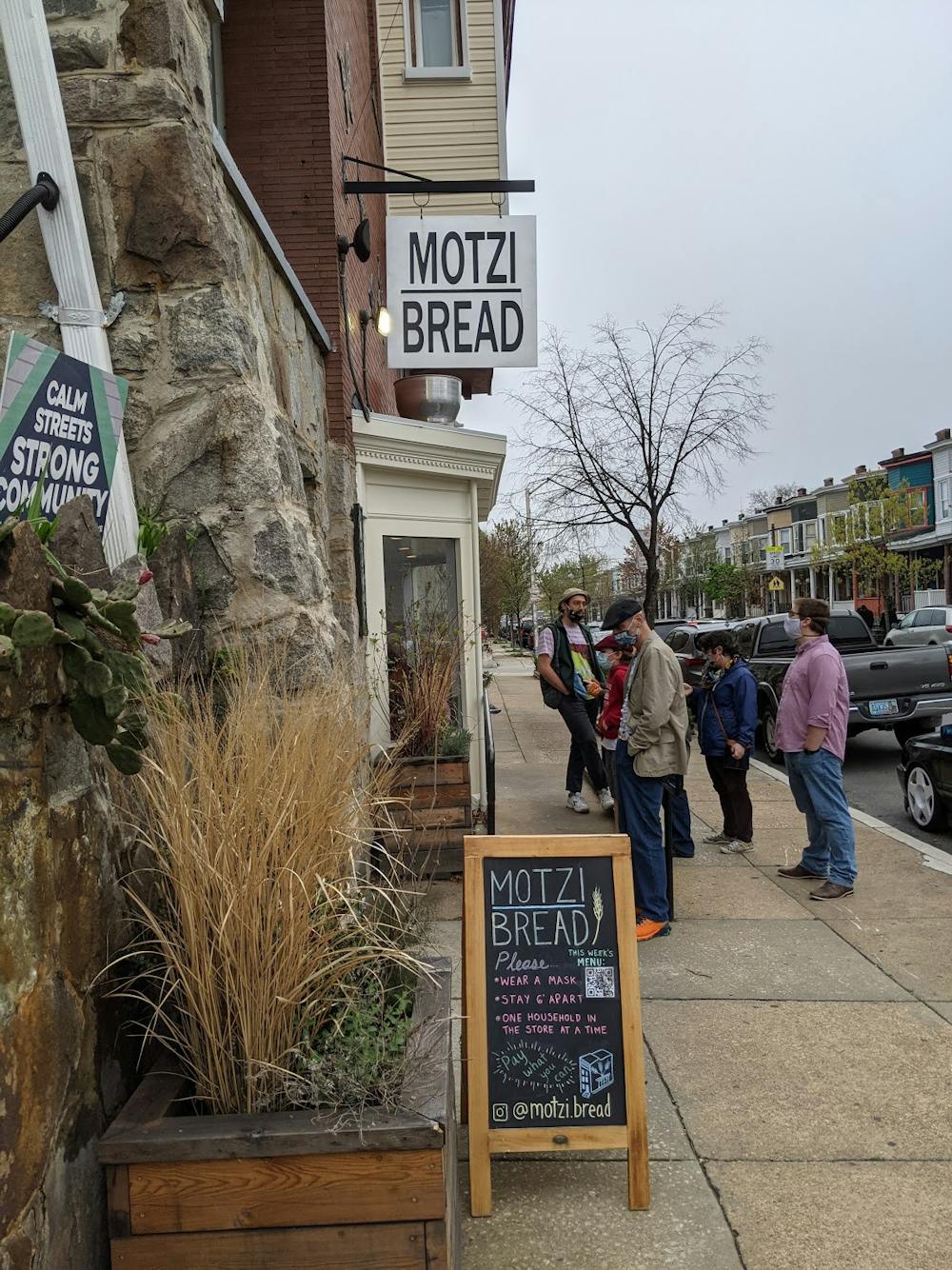Quarantine was the era of the sourdough starter. Throughout the spring of 2020, social media users proudly showed off their creations: a fresh loaf of bread, ready for the world to see.
For bakers Maya Muñoz and Russell Trimmer, however, the pandemic wasn’t the start of their confectionary journey. They had already been selling products through their bakery, Motzi Bread, via a subscription service and at Waverly Farmers Market. But last March marked the start of a new venture: the opening of their physical storefront.
“It was obviously intimidating to open in a pandemic,” Muñoz said in an interview with The News-Letter. “But I think that ultimately, it helped people be more invested than ever, which was amazing to see.”
The physical storefront, located at the corner of E 28th St. and Guilford Avenue, is about a 10-minute walk from Homewood Campus. Muñoz and Trimmer take orders online, and customers come in to pick up orders a few days later. Originally open on Thursdays and Saturdays, Motzi recently added Wednesdays to the mix as well.
Junior Emma Sokolow noted that the bakery appears to be incredibly popular.
“When I went, there was a line out the door,” she said.
Locality drives Motzi’s philosophy. Their website details the process of locally sourcing grains.
“We came upon the idea of a neighborhood bakery as it was a way to invest in a local agricultural economy, particularly around grains, which is a big part of agriculture that’s kind of under network at the moment,” Muñoz said. “We’re part of building that up, which we’re really excited about.”
When COVID-19 hit, Muñoz and Trimmer were also able to accomplish a long-term goal of theirs: turn Motzi into a pay-what-you-can business. With millions of Americans thrown into economically vulnerable situations, the time seemed right to start the new model. Muñoz hopes that more businesses will do the same in the future.
“It’s pretty rare,” she said. “I certainly would love to be a part of that, as a burgeoning movement.”
Sophomore Daniel Gindi heard about Motzi from friends who praised the bakery. On his first visit, he ordered the Classic — a loaf of sourdough — along with a chocolate-cherry babka.
“I actually really liked the bread,” he said. “It was moist... and fresh. I thought the babka tasted mostly like bread, and less like babka — I would’ve liked it to be sweeter.”
The Classic is one of Muñoz’s recommended baked goods. She also suggests the Benne Rye, for which 50 cents of each sale is donated to the Black Yield Institute.
Muñoz and Trimmer fill the small space of the shop with more than just baked goods. Community flyers line the counter with updates on Charles Village happenings. A small selection of Judaica, art and objects used for Jewish ritual practice, is also available for purchase. The Judaica goods come from The Little Shop, run by Ariana Katz, a neighbor of Muñoz and Trimmer. The Little Shop donates 18% of each sale to the Baltimore Abortion Fund.
Though it is rooted in community, Motzi has been lighting up the food scene even outside of Baltimore. Food magazine Bon Appétit published a review of Motzi in its “Highly Recommend” column in October. In March, The Washington Post Magazine profiled the bakery for its spring travel issue.
Gindi, who first visited the bakery in March, made a second order for this weekend. He is trying the Saturday menu for the first time, opting for English muffins.
“I would go back there. Not often, but every once in a while,” he said. “It’s a good place to get bread when you want it. It’s close, it’s convenient.”
Pick up some baked goods to break up a long week of studying, or stop by for a snack to kick off your weekend. Either way, Motzi will be worth your time — and the Baltimore community’s, too.
“We’re trying to be plugged into what’s going on in our neighborhood and the city, be a part of organizing where we can,” Muñoz said. “That really ties to our sense of being rooted to this neighborhood.”





